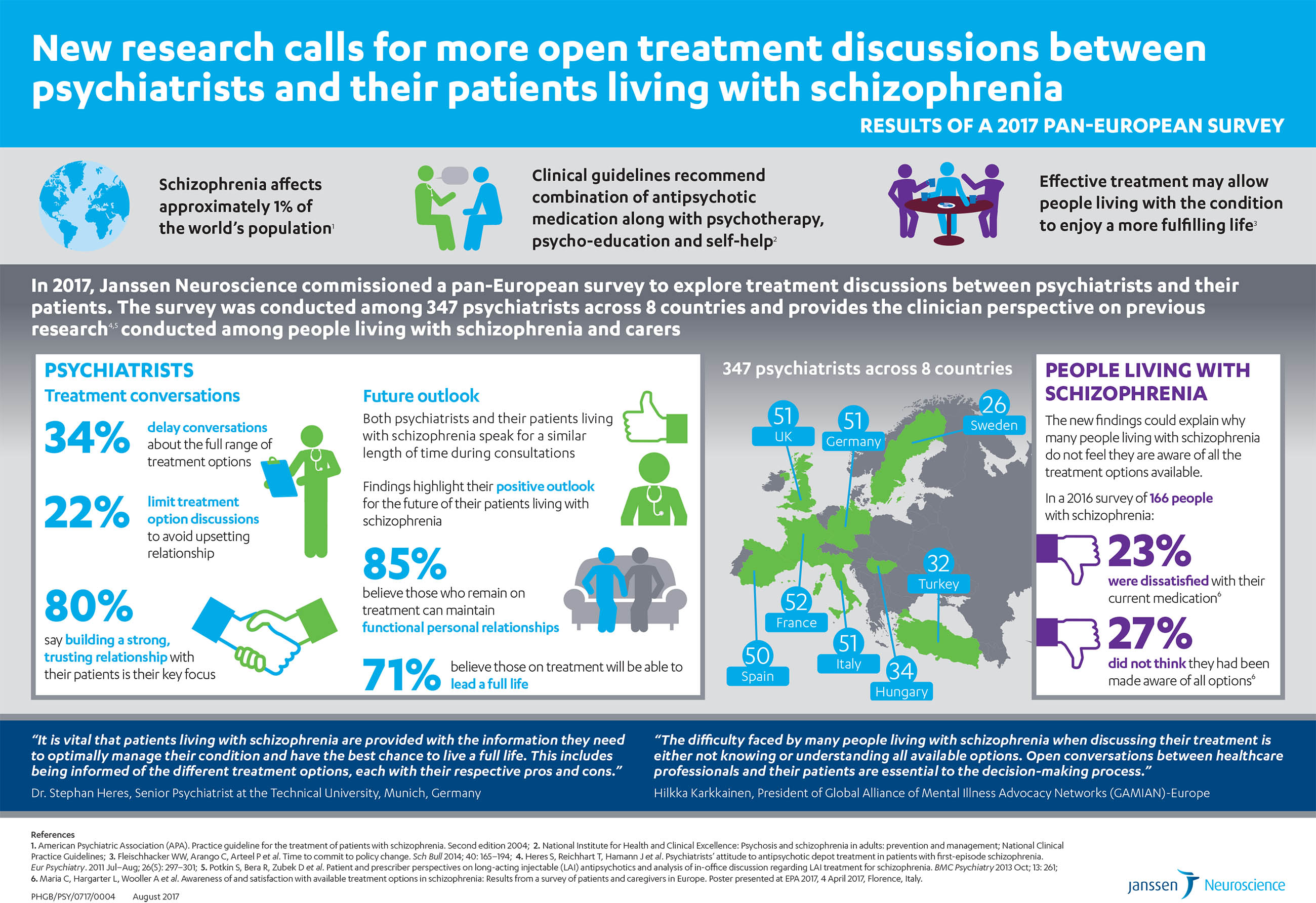New research calls for more open treatment discussions between psychiatrists and their patients living with schizophrenia
BEERSE, BELGIUM, 4 September 2017 – Janssen announces results of pan-European research which shows that a third of psychiatrists (34%) delay conversations about the full range of treatment options with their patients living with schizophrenia. The ‘Open Minds’ survey, conducted among 347 psychiatrists across eight European countries, also reveals that 22% limit treatment option discussions to avoid upsetting the relationship they have with their patients. This may be because the majority of psychiatrists (80%) say building a strong, trusting relationship with their patients is their key focus.

These new findings when considered alongside previous research1,2 could explain why many patients living with schizophrenia are not aware of all the treatment options available. In a 2016 survey of 166 people living with schizophrenia, over a quarter (27%) did not think they had been made aware of all options, and a similar percentage (23%) were dissatisfied with their current medication.3
The research shows that opportunities exist for both psychiatrists and their patients living with schizophrenia to communicate more openly about treatment options, as on average, both speak for a similar length of time during consultations.
“It is vital that patients living with schizophrenia are provided with the information they need to optimally manage their condition and have the best chance to live a full life”, said Dr. Stephan Heres, Senior Psychiatrist at the Department of Psychiatry and Psychotherapy, Technical University Munich, Germany. “This includes being informed of the different treatment options, each with their respective pros and cons.”
Hilkka Karkkainen, President of Global Alliance of Mental Illness Advocacy Networks (GAMIAN)-Europe said, ”The difficulty faced by many people living with schizophrenia when discussing their treatment is either not knowing or understanding all available options. Open conversations between healthcare professionals and their patients are essential to the decision-making process.”
Importantly, the findings highlight the positive outlook psychiatrists have for the future of their patients living with schizophrenia. The majority (85%) believe those who remain on treatment can maintain functional personal relationships, and 71% believe those on treatment will be able to lead a full life.
Janssen has a long heritage in neuroscience and is committed to improving the lives of people living with mental illness. Over 60 years ago, Janssen discovered one of the first treatments for schizophrenia, and continues to invest in expanding the treatment options and supporting the needs of those affected by serious mental illness.
About the survey
The ‘Open Minds’ survey was commissioned by Janssen to explore treatment discussions between psychiatrists and their patients living with schizophrenia. The survey also provides the clinician perspective on previous research conducted among patients and carers, which highlighted their levels of awareness and satisfaction with available treatment options.
The survey was conducted by market research agency Cello Health Insights among 347 psychiatrists from France, Germany, Italy, Spain, UK, Hungary, Sweden and Turkey. Those who took part in the online survey had between 3 and 35 years in practice and treated at least 20 people living with schizophrenia each month (at least 10 in Sweden and Hungary).
About schizophrenia
Schizophrenia is a complex and chronic brain disorder, in which symptoms can be severe and disabling and can affect all aspects of a person’s daily life. It affects people from all countries, socio-economic groups and cultures. Its prevalence is similar around the world - almost one person in every 100 will develop schizophrenia before they reach the age of 60, with men slightly more at risk.4,5
There is no single cause of schizophrenia. Different factors acting together are thought to contribute to the development of the illness. Both genetic and environmental factors seem to be important.6 Symptoms of schizophrenia can include hallucinations, delusions, lack of emotional response, social withdrawal/depression, apathy and a lack of drive or initiative.4
Schizophrenia is typically a lifelong condition, but there are treatments that can be beneficial. Clinical guidelines recommend that the optimal treatment package is a combination of antipsychotic medication along with psychotherapy, psycho-education and self-help.7 Effective treatment may allow people with the condition to enjoy a more fulfilling life, which may include returning to work or study, independent living and social relationships, which in turn can aid their recovery.8
About the Janssen Pharmaceutical Companies
At the Janssen Pharmaceutical Companies of Johnson & Johnson, we are working to create a world without disease. Transforming lives by finding new and better ways to prevent, intercept, treat and cure disease inspires us. We bring together the best minds and pursue the most promising science. We are Janssen. We collaborate with the world for the health of everyone in it. Learn more at www.janssen.com/EMEA. Follow us at www.twitter.com/janssenEMEA.
Janssen-Cilag International NV is part of the Janssen Pharmaceutical Companies of Johnson & Johnson.
References
- Heres S, Reichhart T, Hamann J et al. Psychiatrists' attitude to antipsychotic depot treatment in patients with first-episode schizophrenia. Eur Psychiatry. 2011 Jul-Aug;26(5):297-301.
- Potkin S, Bera R, Zubek D et al. Patient and prescriber perspectives on long-acting injectable (LAI) antipsychotics and analysis of in-office discussion regarding LAI treatment for schizophrenia. BMC Psychiatry 2013 Oct;13:261.
- Maria C, Hargarter L, Wooller A et al. Awareness of and satisfaction with available treatment options in schizophrenia: Results from a survey of patients and caregivers in Europe. Poster presented at EPA 2017, 4 April 2017, Florence, Italy.
- American Psychiatric Association (APA). Practice guideline for the treatment of patients with schizophrenia. Second edition 2004;42. Available at http://psychiatryonline.org/pb/assets/raw/sitewide/practice_guidelines/guidelines/schizophrenia.pdf (last accessed August 2017).
- Picchioni M, Murray R. Schizophrenia. BMJ 2007;335:91.
- Lang U, Puls I, Muller DJ et al. Molecular mechanisms of schizophrenia. Cell Physiol Biochem 2007;20(6):687-702.
- National Institute for Health and Clinical Excellence: Psychosis and schizophrenia in adults: prevention and management; National Clinical Practice Guidelines Number CG178. Available at https://www.nice.org.uk/guidance/cg178 (last accessed August 2017).
- Fleischhacker WW, Arango C, Arteel P. et al. Time to commit to policy change. Sch Bull 2014;40:165-194.
August 2017
PHGB/PSY/0717/0003

